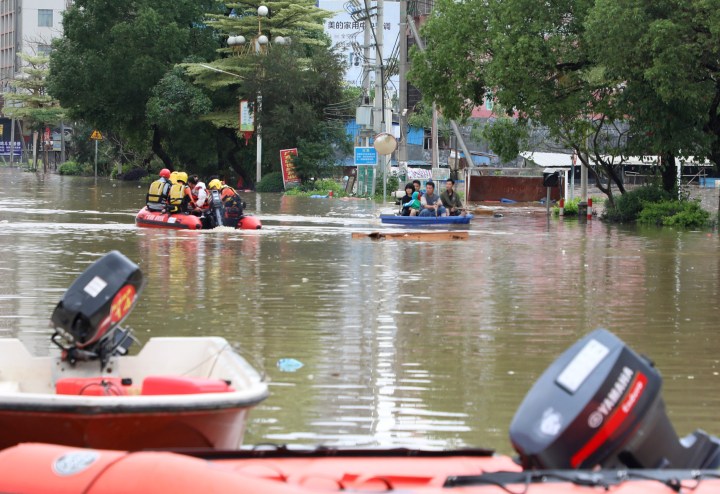China floods
Floods swamp southern China, spark extreme weather fears

QINGYUAN, China, April 22 (Reuters) - Floods swamped cities in southern China's densely populated Pearl River Delta following record-breaking rains, sparking worries about the region's defences against bigger deluges induced by extreme weather events.
The province once dubbed the “factory floor of the world” is prone to summer floods. Its defences against disruptive floods were severely tested in June 2022 when Guangdong was pounded by the heaviest downpours in six decades. Hundreds of thousands of people were evacuated.
Since Thursday, Guangdong has been battered by unusually heavy, sustained and widespread rainfall, with powerful storms ushering in an earlier-than-normal start to the province’s annual flooding season in May and June.
In Qingyuan, a relatively small city of 4 million, residents counted their losses.
“My rice fields are fully flooded, my fields are gone,” Huang Jingrong, 61, told Reuters.
Huang was sheltering under an overpass with other farmers from his village, alongside an assortment of personal belongings, including a washing machine.
“I won’t be making any money this year, I will be making losses,” he told Reuters, estimating his losses at about 100,000 yuan ($13,800).
“What can we do? We won’t get reimbursed for our losses.”
Over the weekend, waterways in Guangdong overflowed including the river near Huang’s village, where flood-waters have reached the second storey of houses after washing out paddy and potato fields.
In other parts of Qingyuan, rescuers tackled neck-high waters to extract residents including an elderly lady trapped in waist-deep water in an apartment building.
Others remained on the upper floors of their houses, waiting for the waters to recede as friends delivered food by boat.
Before 2022, it rarely rained as heavily as it does now, and the flood-waters were never as high, said Qingyuan resident Lin Xiuzheng, an online retail sales worker.
Weather events in China have become more intense and unpredictable because of global warming, scientists say, with record-breaking rainfall and drought assailing the world’s second-largest economy, often at the same time.
Precipitation records for April have been broken in many parts of Guangdong, with the cities of Shaoguan, Zhaoqing and Jiangmen to the west and north of Guangzhou also half-submerged in flood-waters.
SWOLLEN RIVERS
The downpours have killed four people and 10 others remain missing in the province as of Monday, state-owned Xinhua News Agency reported.
Across the province, 36 houses collapsed while 48 were severely damaged, resulting in a direct economic loss of nearly 140.6 million yuan, Xinhua reported.
Two companies told Reuters there had been no immediate impact to business or supply chains.
“Everything’s running as usual and everyone got to work,” said a person who answered the phone at Camelot PCB, a print circuit board company that supplies Tesla TSLA.O and other electric vehicle makers.
Polyrocks Chemical, a plastics company that supplies technology giants such as Apple AAPL.O, Huawei and Samsung 005930.KS, also said its operations were not affected.
Many rivers remained swollen on Monday, however, at levels above safety thresholds, with rainfall in recent days two to three times more than normal at this time of the year.
The intense convective weather in southern China was caused by a stronger-than-normal subtropical high, a semi-permanent high pressure system circulating north of the equator.
The subtropical high led to warmer temperatures that drew in more moisture-laden air from the South China Sea and the Bay of Bengal, Chinese meteorologists said, resulting in the intense precipitation.
(Reporting by Liz Lee, Ryan Woo and Shanghai newsroom; Additional reporting by David Kirton in Shenzhen; Editing by Christian Schmollinger, Sharon Singleton and Ed Osmond)




















Comments - Please login in order to comment.